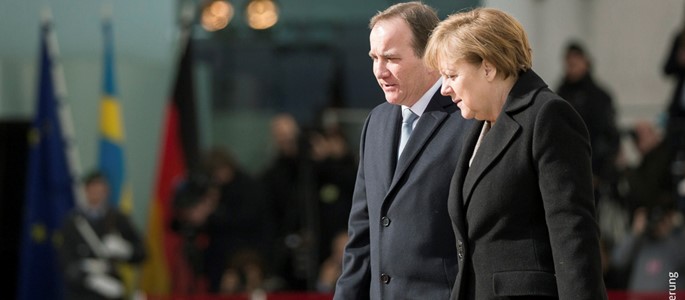Sweden and Germany inspired by Denmark
Once again, Denmark has become a first-mover – negative or positive, depending on your political opinion.
The Danish government has introduced serious restrictions for refugees in two stages; the first one in the autumn last year and the latest in January. The restrictions cover four areas: accommodation (including registration and detention), length of time for granting asylum, benefits and finally the right to family reunification (read more here).
In several of the same fields, Sweden and Germany are introducing similar restrictions. The Swedish have not been passed yet, but will probably be. At the same time, waiting times for asylum processing as well as family reunification cases have risen significantly in all three countries since last autumn. A more or less permanent border control in the three countries has also been installed – most surprising is the Swedish control carried out on Danish territory, covering all travellers by train at Kastrup station.
Sweden
The Swedish government has presented a proposal planned to be in effect for 3 years. The proposal was met with massive criticism from all the organisations invited to respond, but has majority in parliament and will probably be in effect from July 20. In short, these are the changes:
• In the future, all refugees will only be granted temporary stay, whereas it used to be permanent. Convention status refugees will be granted 3 years stay, but refugees with protection status only 13 months.
• Permanent residence permit will only be granted to persons who can provide for themselves.
• Persons who have applied for asylum after November 24 2015 and who are not granted convention status, will not have the right to family reunification at all. Unaccompanied minors will, however, not come under this rule. This restriction is without comparison the most serious, as it means only 40% of the recently arrived refugees will get their family members to Sweden, if we look at the numbers for 2016. Sweden does not grant convention status to most Syrian refugees, such as Denmark and Germany do.
• Humanitarian residence permit will only be granted when necessary due to international obligations. Today, this status amounts to 6% of all permits.
• The category "others in need of protection" will no longer give access to residence permit.
Germany
Last year in November, Germany passed Asylum Package I, including a new Manifestly Unfounded speedy procedure for certain countries of origin, strongly inspired by the Danish, which has been in place for years. Apart from a quick processing of a few weeks, special reception camps were also set up for this group. The countries on the list were: Albania, Bosnia-Hercegovina, Macedonia, Ghana, Kosovo, Montenegro, Senegal, Serbia. Besides, part of the benefits was changed into coupons.
The Asylum Package II from January included more serious restrictions:
• Manifestly Unfounded speedy procedure will also cover Algeria, Morocco and Tunesia.
• Cut down in benefits for all asylum seekers.
• Refugees with protection status will have to wait for 2 years before applying for family reunification. A long waiting period, when taken into consideration that the processing time can already now take several years (waiting time arises especially at the German embassies in Turkey for the Syrian refugees). In Germany the vast majority of refugees are granted convention status, but the government wants to change that. The restriction also covers unaccompanied minors.
Sources: svt, the Swedish government, Migrationsverket, Reuters, DW, asylumineurope.org.


